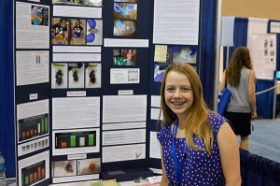New bag keeps food fresh longer
Invention harnesses oxygen-trapping power of iron
By Sid Perkins

Food doesn’t stay fresh forever, even in a refrigerator. Fuzzy mold can grow on fruit, veggies and other items even if they’re kept in a sealed container. But a 15-year-old inventor now has developed a new type of resealable bag that can keep food fresh longer. It relies on a pouch of powder that chemically sucks oxygen out of the bag. And this could keep fungi and even some food-poisoning germs from growing.
About 21 percent of the air is made up of oxygen. All animals rely on this gas. It’s essential to chemical factories in their cells that create energy that those cells need to survive. Many germs use the same chemical reactions to grow and thrive. So denying them oxygen should keep these freeloaders from growing on food, causing it to spoil or make people sick, says Carolyn Jons. She’s a freshman at Eden Prairie High School in Eden Prairie, Minn.
Resealable plastic bags help limit the amount of oxygen that can reach stored food. But no matter how carefully people squeeze the bags to force out excess air, some oxygen will remain behind. And if microbes are inside the bag, which they almost always are, they will have enough to grow.
So Jons designed a new type of plastic bag that removes that oxygen. It zippers shut just like most other resealing bags. But on one side of the bag, there’s a small window of material that allows air to permeate it (pass through it). You might think of this material as a screen door. It lets gases flow between the bag and a pouch on the other side. That pouch is filled with extremely tiny particles of iron, which Jons calls “nano-iron.” (In Greek, nano means dwarf. In the metric system, the prefix means “one-billionth.”)
The nano-iron reacts with oxygen inside the sealed bag. It binds up the gas so that it no longer will be available to microbes. (This is the same chemical reaction that occurs when a large hunk of iron rusts. The end result in both cases is iron oxide.)
In her tests, Jons compared growth rates of mold on cheese and strawberries in plain bags with those kept inside her bags containing a pouch of nano-iron. All tests were run at room temperature. (If tests had been performed at refrigerator temperatures, growth rates would have been much slower, she notes.)
Visible mold started growing within three days on strawberries sealed in a normal plastic bag. But those sealed in the teen’s new nano-iron bags resisted mold growth for seven days.
In some tests with cheese, mold grew inside the normal bag after one week. But when the same type of cheese was sealed in an oxygen-slurping nano-iron bag, it remained mold-free for much longer. In one test, the cheese resisted mold for roughly 16 and a half weeks (almost four months!) before Jons stopped the test.
The teen presented her results May 13 in Phoenix, Ariz., at the Intel International Science & Engineering Fair. The Society for Science & the Public, which created the fair in 1950, still runs the competition. (SSP also publishes Science News for Kids.)
In other tests, Jons showed that people can easily seal the bags effectively. She also showed that the bags have a long shelf-life, meaning they don’t start reacting with oxygen until they’re opened for the first time.
Besides fruit and cheese, the nano-iron bags could be used to keep meats, breads, pastas or any sort of produce from spoiling, she suggests. And since oxygen is the major trigger for making the fats in meat become rancid, these bags also could extend the desirable flavor of meats longer.
Power Words:
oxygen A gas that makes up about 21 percent of the atmosphere. All animals and many microorganisms need oxygen to fuel their metabolism.
metabolism The set of life-sustaining chemical reactions that take place inside cells. These reactions enable organisms to grow, reproduce, move and otherwise respond to their environments.
permeable Having pores or openings that permit liquids or gases to pass through. Sometimes materials can be permeable for one particular type of liquid or gas (water, for example) but block others (such as oil).







